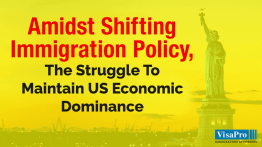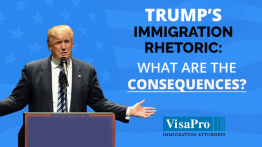Introduction
In his time in office, President Trump has developed a reputation for his hardline stance against immigration. And while much of the administrations energy has been focused on preventing border crossings at the U.S.’s southern border with Mexico, recent policies have broadened their scope with respect to limiting immigration. Between Trump’s cuts to the H1B visa program for skilled workers to his notorious “Buy American and Hire American” initiative, it is clear that the administration is more committed to preserving a sense of nationalism than the pro-immigrant values that America was founded upon. The latest in this series of anti-immigrant policies has been announced in the form of a proposed restriction on countries whose nationals tend to over-stay their short-term visitor visas.
Check Out Policy Details
While specific policy details have yet to be released, the description provided by the White House amounts to a retaliation against countries with high rates of overstay on their visas. These penalties would likely take the form of a more difficult visa application process and/ or in limiting the duration for foreign nationals of affected countries. The affected countries will presumably be given notice of the potential changes to policy, which act as an ultimatum by the United States government. If visa overstay rates do not decline, the countries will be punished with restrictions on visas. In the memo sent out by the president, a timeline of four months has been established in which the State Department will consult with Homeland Security and the Attorney General’s office to make specific policy recommendations.
The severity of these restrictions is especially pronounced with consideration to the added limits that the White House has proposed for certain visa types. For instance, the Trump administration has increased visa denials and proposed additional limits on student and investor visas. These changes indicate an increasingly radical anti-immigration policy, which has been cemented with Trump’s removal of key staff members in favor of outsiders with even harsher stances on immigration.
Who Will Be Affected?
While the details of the policy have not been set in stone, a memo sent out by Trump is a good preliminary indicator of the scope of the proposed restrictions. The memo based its information on data from a recent Homeland Security report. This data led the president to suggest that federal agencies consider taking action against countries with a visa overstay rate of 10 percent or more on their business and tourism visas. According to their report, there are currently 20 countries that have visa overstay rates in excess of 10 percent. Notably, 13 of the 20 countries on the list are African nations. This discrepancy has led many to criticize the policy as discriminatory and potentially ineffective at reducing the number of illegal immigrants in the country.

Is It Effective?
Perhaps the most important aspect to consider around any proposed policy is its effectiveness at achieving its purported goal. In this regard, the proposed overstay penalties do not appear promising. This is largely due to the administrations election to use percentage rather than the number of overstays to distribute sanctions. Consequently, while the countries listed might have a high percentage of overstays, this fact does not necessarily translate to a high number of undocumented immigrants in the country. For example, the country with the highest percentage of overstays- Djibouti, a small African country- only accounted for 180 foreign nationals. This scenario is replicated in most of the other countries on the list. Since most of these countries have a relatively small population, the proportion of visa overstays seems exaggerated with relation to the low number of visas that their citizens obtain each year. These low figures do not contribute significantly to the (approximately) 667,000 people that overstayed their visa in 2018. The only real exception on the list is Nigeria, which had an overstay rate of around 30 percent and saw approximately 30,000 of its foreign nationals overstay their visas in 2018.
Conclusion
In conclusion, the White House’s proposed restrictions are unlikely to have a meaningful impact on the problem of visa overstay in the United States. Despite their ineffectiveness, these policies are one in a series of troubling moves by the Trump administration to curb immigration. And while this trend is unnerving, it should not be allowed to interfere with the travel or residency plans of any person with an interest in the U.S.
In such an unstable environment, it is important to consider your legal options to ensure that you are able to access your rights to freely travel into the country. If you are facing difficulties due to the new immigration policy, Schedule A Free Immigration Attorney Consultation Today. We’ll be happy to construct a personalized legal strategy to help you achieve your goals regardless of the political climate.
What VisaPro Customers Are Saying
[VisaPro legal team] was incredibly knowledgable and extremely helpful throughout the process. We were exceptionally impressed with how they have combined the great personal and communication skills they bring and also technology with a highly intuitive website which guides you and keeps you updated throughout the process……..This is a true testimonial, I would highly recommend VisaPro to anyone looking for guidance and success in this area."
 Paul Lyons, President, Atlas Intelligence Inc
Paul Lyons, President, Atlas Intelligence Inc



